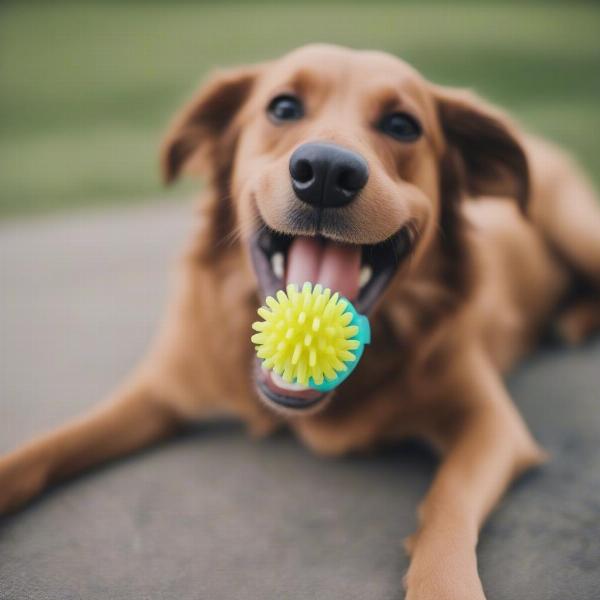Recognizing the subtle signs of a toothache in your dog can be challenging. Dogs are masters at hiding discomfort, often continuing to eat or play despite experiencing pain. So, how to tell if your dog has a toothache? This article will guide you through the common symptoms, causes, and what to do if you suspect your furry friend is suffering from dental pain. Early detection is key to preventing further complications and ensuring your dog’s overall well-being.
Common Signs of Toothache in Dogs
While dogs won’t tell us directly, several behavioral and physical changes can indicate a toothache. Look out for the following:
- Changes in eating habits: Dropping food, chewing on one side of the mouth, reluctance to eat hard food, or complete loss of appetite.
- Excessive drooling: More drool than usual, especially if tinged with blood.
- Pawing at the mouth: Frequent pawing or rubbing their face against objects can signal discomfort in the mouth area.
- Whining or whimpering: Especially while eating or when the mouth is touched.
- Swelling or redness around the mouth: Visible inflammation can indicate an infection.
- Bad breath: A noticeable increase in bad breath can be a sign of dental disease.
- Behavioral changes: Irritability, aggression, or withdrawal.
Causes of Toothache in Dogs
Understanding the underlying causes of toothache can help you prevent future dental issues. Some common culprits include:
- Periodontal disease: A bacterial infection of the gums and surrounding tissues, often caused by plaque and tartar buildup.
- Fractured teeth: Broken or chipped teeth can expose the sensitive pulp and cause significant pain.
- Abscesses: Infections at the root of the tooth, leading to painful swelling and discomfort.
- Retained baby teeth: Sometimes, puppy teeth don’t fall out as they should, leading to overcrowding and potential pain.
- Oral tumors: Although less common, tumors can cause pain and swelling in the mouth.
What to Do if You Suspect Your Dog Has a Toothache
If you notice any of these signs, it’s essential to take your dog to the veterinarian as soon as possible. Delaying treatment can lead to more severe dental problems and even affect your dog’s overall health.
At the Vet’s Office
The veterinarian will perform a thorough oral examination, potentially including dental X-rays, to determine the cause of the toothache and recommend appropriate treatment. Treatment options may include:
- Professional cleaning: To remove plaque and tartar buildup.
- Tooth extraction: For severely damaged or infected teeth.
- Root canal therapy: To save a tooth with a damaged pulp.
- Antibiotics: To combat infection.
- Pain medication: To manage discomfort.
Preventing Toothache in Dogs
Proactive dental care is crucial for preventing toothaches and maintaining your dog’s oral health. Here are some tips:
- Regular brushing: Brush your dog’s teeth daily with a pet-specific toothpaste.
- Dental chews and treats: Offer dental chews and treats designed to reduce plaque and tartar buildup.
- Regular veterinary checkups: Schedule regular dental checkups with your veterinarian for professional cleanings and examinations.
- Providing a healthy diet: A balanced diet can contribute to overall dental health.
 Dog Chewing Dental Toy
Dog Chewing Dental Toy
Conclusion
Identifying a toothache in your dog requires careful observation and attention to their behavior. By being aware of the common signs and understanding the importance of preventative care, you can help ensure your furry friend maintains healthy teeth and gums and lives a pain-free life. If you suspect your dog has a toothache, don’t hesitate to contact your veterinarian immediately.
FAQ
- How can I tell if my dog is in pain? Look for changes in behavior, such as reduced appetite, whimpering, excessive drooling, and pawing at the mouth.
- Can I use human toothpaste on my dog? No, human toothpaste contains ingredients that are toxic to dogs. Always use a pet-specific toothpaste.
- How often should I brush my dog’s teeth? Ideally, you should brush your dog’s teeth daily.
- What are some good dental chews for dogs? Look for dental chews approved by the Veterinary Oral Health Council (VOHC).
- How much does a dog dental cleaning cost? The cost varies depending on the location and the extent of the cleaning, but it typically ranges from $200 to $500.
- Can a toothache be serious for a dog? Yes, untreated dental infections can spread to other parts of the body and cause serious health problems.
- How can I prevent my dog from getting a toothache? Regular brushing, dental chews, and veterinary checkups are the best ways to prevent toothaches.
ILM Dog is a leading online resource for dog owners worldwide, offering expert advice on all aspects of dog care and wellbeing. We cover a wide range of topics, from breed selection and puppy care to senior dog care, training, nutrition, and health. Our mission is to provide practical, trustworthy information to help you give your furry friend the best possible life. For professional guidance on dog health, training, nutrition, or any other dog-related query, contact our experts at [email protected] or call us at +44 20-3965-8624. Visit ILM Dog for more information.